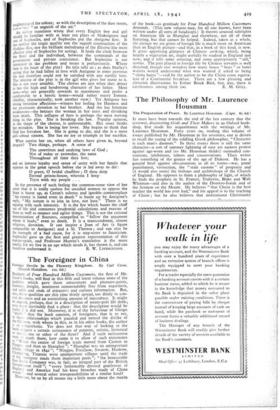The Foreigner in China
Foreign Devils in the Flowery Kingdom. By Carl Crow. (Hamish Hamilton. sos. 6d.) READERS of Four Hundred Million Customers, the first of Mr. Crow's books, will find in this fifth and latest volume some of the qualities which gave them amusement and pleasure-gaiety, humour, insight, sentiment commendably free from sugariness, and odds and ends of attractiv2 and curious information. But, alas, these qualities are this time thinly spread, too thinly to con- ceal draoness and an astonishing amount of inacculacy. It might be argued, perhaps, that in a description of treaty-port life drab-, ness must inevitably find a place : that the description would be faulty if it did not. Moreover, it is of the behaviour of foleign "devils " that the book consists, of foreigners, that is to say, thoSe• relationships which puzzled and earned the dislike of the Chinese, with whom in this, as in hii other books, the author is So sympathetic. Yet does not that way of looking at the book suggest a certain seriousness of purpose, artistic, historical or moral, one or other of the three? And if such seriousness were in truth there, how came it to allow of such statements as"When the centre of foreign trade moved from Canton to '''ing1)0, and then to Shanghai "; " Shanghai was an unimportant fishing village in 1842 "; " Ningpo, Foochow, Swatow, Hankow, Chungking Tientsin were unimportant villages until the trade 2,1 the :oreigner made them important ports "; " the honourable India Company was, in fact, an integral part of the British Government itself "; " every fashionably dressed gentleman of england. and America had his knee breeches made of China cotton' ; and several other irresponsibilities of a similar kind? However, let us by all means say a little more about the merits
of the book---as gratitude for Four Hundred Million Customers demands. (This new volume may, for all one knows, have been written under all sorts of handicaps.) It throws unusual sidelights on American life in Shanghai and elsewhere, not all of them flattering, but that cannot be helped. Indeed, taken as a whole, the picture we are given of foreign life is much more an American than an English picture—and that, in a book of this kind, is new. It gives appetising glimpses of Chinese cooking, which, being largely a vegetarian art, might usefully be studied in England just now; and it tells some amusing, and some appropriately " tall," stories. The part played in foreign life by Chinese servants is well sketched, though one wonders how many house " boys " or hotel waiters would understand what was wanted if asked to bring " chota hazra "—said by the author to be the China coast equiva- lent of a Continental breakfast. There are a few pleasing and cleverish illustrations by Esther Brock Bird, but, alas, there is


























 Previous page
Previous page